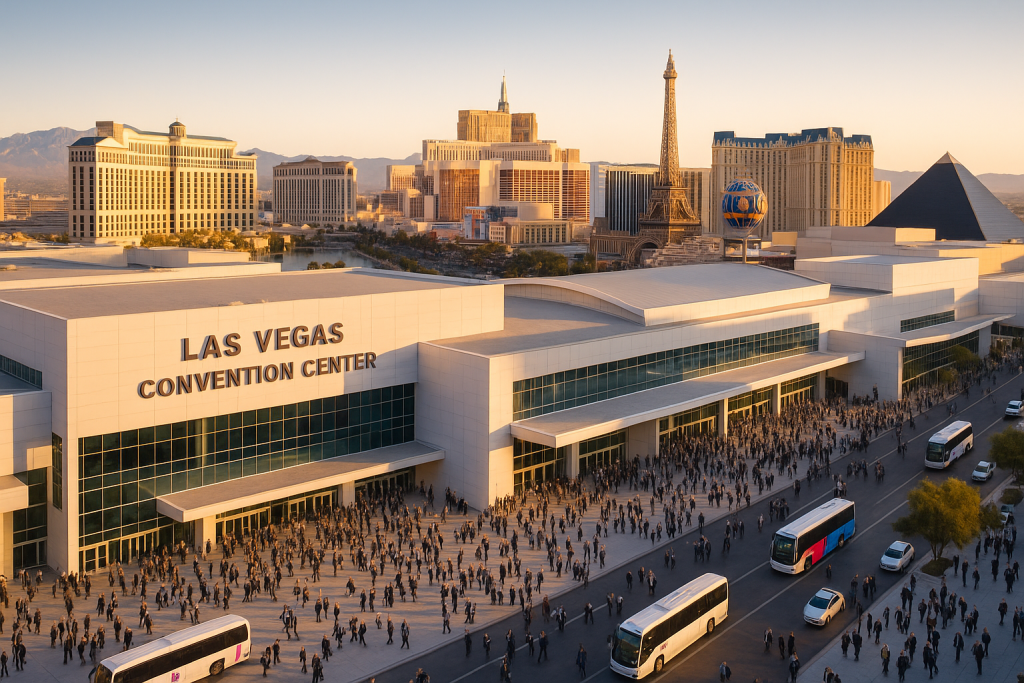Las Vegas’s unique infrastructure, economic model, and strategic positioning have transformed it into the premier destination for large-scale corporate gatherings, fundamentally reshaping the global events industry
In the competitive landscape of corporate event destinations, Las Vegas has emerged as an undisputed leader for hosting mega-events with 20,000 or more attendees. According to the 2024 LVCVA Visitor Profile Study, 47% of attendees at corporate meetings and conventions said they were more interested in attending the event because it was held in Vegas, a statistic that underscores the city’s magnetic pull for business professionals worldwide. This phenomenon extends far beyond the glittering facade of the Strip, rooted instead in a sophisticated convergence of infrastructure capacity, economic efficiency, and strategic business advantages that collectively position Las Vegas as corporate America’s preferred stage for its most ambitious gatherings.
The numbers paint a compelling picture of Las Vegas’s dominance in the mega-event sector. The Las Vegas Convention Center alone hosts over 6 million attendees annually, making it one of the busiest convention centers in the world. This volume is exemplified by flagship events such as the Consumer Electronics Show (CES), which attracts nearly 140,000 attendees and serves as the world’s largest consumer technology tradeshow. CES 2024 saw more than 138,000 attendees, with over 4,500 exhibitors across 2.5 million net square feet of floor space, demonstrating the sheer scale that Las Vegas can accommodate seamlessly.
Unmatched Infrastructure and Capacity Advantages
The foundation of Las Vegas’s success in mega-events lies in its purpose-built infrastructure designed to handle massive crowds with operational precision. The Las Vegas Convention Center offers approximately 2.9 million square feet of exhibit space, 225 meeting rooms spanning more than 390,000 square feet, and seating capacities ranging from 20 to 2,500. This scalability is crucial for events requiring diverse configurations, from intimate breakout sessions to massive keynote presentations.
Beyond raw square footage, Las Vegas offers what few destinations can match: concentrated capacity. With a capacity of over 200,000 attendees, the Las Vegas Convention Center is one of the best large corporate event venues in Las Vegas, but the city’s true strength lies in its ecosystem approach. Major hotels along the Strip function as extensions of the convention infrastructure, providing additional meeting spaces, accommodation, and dining facilities within walking distance or short shuttle rides from primary venues.
The city’s transportation infrastructure further reinforces its appeal for mega-events. McCarran International Airport‘s proximity to the Strip, coupled with the destination’s compact geography, means attendees can travel from airport to accommodation to convention venue with minimal logistical complexity. This streamlined experience becomes increasingly valuable as event sizes grow and coordination challenges multiply exponentially.
Economic Efficiency and Strategic Pricing Models
Las Vegas operates on an economic model that fundamentally differs from traditional business destinations, creating compelling cost advantages for large-scale corporate events. The city’s hospitality sector, built on volume economics from leisure tourism, can absorb corporate events at competitive rates while maintaining high service standards. This pricing efficiency becomes particularly pronounced for mega-events, where economies of scale translate into significant cost savings compared to traditional business centres like New York or London.
The all-inclusive nature of Las Vegas’s offerings presents additional economic advantages. Corporate event planners can bundle accommodation, dining, entertainment, and meeting facilities through single negotiations, reducing both direct costs and administrative overhead. This consolidation becomes invaluable when managing events with tens of thousands of attendees, where even minor per-person savings translate into substantial budget impacts.
Tax incentives and destination marketing support further enhance Las Vegas’s economic proposition. The Las Vegas Convention and Visitors Authority actively courts large-scale corporate events through competitive packages and marketing partnerships, viewing these gatherings as crucial drivers of broader economic impact beyond immediate event expenditure.
Strategic Business Benefits and Networking Dynamics
The decision to host major corporate events in Las Vegas extends beyond purely logistical considerations, encompassing strategic business advantages that enhance event outcomes and participant engagement. The destination’s unique positioning creates an environment where business networking naturally extends beyond formal programme hours, facilitated by the concentration of attendees within the Strip’s entertainment corridor.
This extended engagement model proves particularly valuable for industry conferences and trade shows, where relationship building and deal-making often occur in informal settings. The abundance of restaurants, entertainment venues, and networking spaces creates multiple touchpoints for business interaction, maximising the return on investment for both event organisers and participants.
Las Vegas’s reputation as a destination also serves as a powerful attendance driver. The city’s appeal helps event organisers overcome the perpetual challenge of securing executive participation and international attendance. When senior leaders view an event location as personally desirable, attendance rates typically improve, enhancing the event’s overall value proposition and business outcomes.
Operational Excellence and Vendor Ecosystem
The maturity of Las Vegas’s events industry has created a sophisticated vendor ecosystem that can seamlessly support mega-events with minimal coordination complexity. Decades of hosting large-scale gatherings have produced specialist suppliers, experienced service providers, and established operational protocols that reduce risk and enhance execution quality for event organisers.
This operational infrastructure becomes crucial for events exceeding 20,000 attendees, where seemingly minor logistical failures can cascade into significant disruptions. Las Vegas’s established supply chains, from audiovisual services to catering operations, are designed to scale efficiently while maintaining quality standards, providing event organisers with confidence in execution capabilities.
Challenges and Competitive Context
Despite its advantages, Las Vegas faces certain limitations as a corporate event destination. The city’s entertainment-focused reputation can occasionally conflict with more conservative corporate cultures, potentially limiting its appeal for certain industries or international organisations. Additionally, the destination’s seasonal pricing fluctuations, driven by leisure tourism patterns, can create cost pressures during peak periods.
Competitive destinations like Orlando, Chicago, and emerging international venues continue to develop their mega-event capabilities, challenging Las Vegas’s dominance through different value propositions. Orlando’s family-friendly environment and expanding convention facilities, Chicago’s central location and business credentials, and international destinations’ cultural appeal each present alternative advantages for specific event types and corporate preferences.
Future Outlook and Industry Implications
The trajectory of Las Vegas as a mega-event destination appears increasingly secure, supported by continued infrastructure investment and evolving corporate event strategies. Recent expansions to convention facilities and transportation networks suggest sustained commitment to maintaining competitive advantages in the large-scale events sector.
The post-pandemic evolution of corporate events has actually strengthened Las Vegas’s position, as organisations prioritise destinations that can guarantee successful execution of major gatherings while providing compelling reasons for attendance. The city’s ability to deliver both operational excellence and participant engagement aligns well with corporate priorities for maximising event investment returns.
As global companies increasingly view major corporate events as strategic business tools rather than operational necessities, Las Vegas’s unique combination of infrastructure capacity, economic efficiency, and engagement enhancement positions it to remain the preferred choice for organisations seeking to create meaningful business impact through large-scale gatherings. The city’s evolution from entertainment destination to sophisticated business venue reflects broader changes in corporate event strategy, where success is measured not merely by logistical execution but by business outcomes achieved through strategic destination selection.


